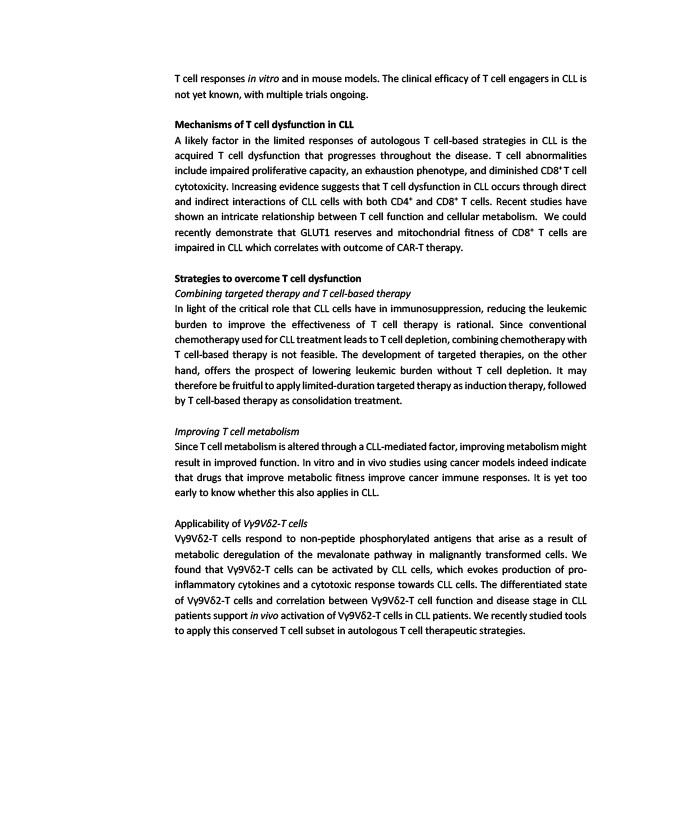
T cell responses in vitro and in mouse models. The clinical efficacy of T cell engagers in CLL is
not yet known, with multiple trials ongoing.
Mechanisms of T cell dysfunction in CLL
A likely factor in the limited responses of autologous T cell-based strategies in CLL is the
acquired T cell dysfunction that progresses throughout the disease. T cell abnormalities
include impaired proliferative capacity, an exhaustion phenotype, and diminished CD8+ T cell
cytotoxicity. Increasing evidence suggests that T cell dysfunction in CLL occurs through direct
and indirect interactions of CLL cells with both CD4+ and CD8+ T cells. Recent studies have
shown an intricate relationship between T cell function and cellular metabolism. We could
recently demonstrate that GLUT1 reserves and mitochondrial fitness of CD8+ T cells are
impaired in CLL which correlates with outcome of CAR-T therapy.
Strategies to overcome T cell dysfunction
Combining targeted therapy and T cell-based therapy
In light of the critical role that CLL cells have in immunosuppression, reducing the leukemic
burden to improve the effectiveness of T cell therapy is rational. Since conventional
chemotherapy used for CLL treatment leads to T cell depletion, combining chemotherapy with
T cell-based therapy is not feasible. The development of targeted therapies, on the other
hand, offers the prospect of lowering leukemic burden without T cell depletion. It may
therefore be fruitful to apply limited-duration targeted therapy as induction therapy, followed
by T cell-based therapy as consolidation treatment.
Improving T cell metabolism
Since T cell metabolism is altered through a CLL-mediated factor, improving metabolism might
result in improved function. In vitro and in vivo studies using cancer models indeed indicate
that drugs that improve metabolic fitness improve cancer immune responses. It is yet too
early to know whether this also applies in CLL.
Applicability of Vγ9Vδ2-T cells
Vγ9Vδ2-T cells respond to non-peptide phosphorylated antigens that arise as a result of
metabolic deregulation of the mevalonate pathway in malignantly transformed cells. We
found that Vγ9Vδ2-T cells can be activated by CLL cells, which evokes production of pro-inflammatory
cytokines and a cytotoxic response towards CLL cells. The differentiated state
of Vγ9Vδ2-T cells and correlation between Vγ9Vδ2-T cell function and disease stage in CLL
patients support in vivo activation of Vγ9Vδ2-T cells in CLL patients. We recently studied tools
to apply this conserved T cell subset in autologous T cell therapeutic strategies.